Taking care of a Dachshund is more than just providing food and shelter.
It involves understanding their unique health challenges and taking proactive steps to prevent common issues.
In this blog post on Dachshund Health and Wellness: Common Issues and Prevention I’ll share essential tips on how to keep your Dachshund healthy and happy.
1️⃣ 🩺 Understanding Dachshund Health Risks
📉 Genetic Predispositions
Dachshunds are known for their long bodies and short legs, but this unique build comes with certain genetic risks.
They are particularly prone to back problems, which can lead to serious health issues if not managed properly.
Understanding these predispositions is the first step toward preventing potential health problems.
🧬 Common Health Concerns
Dachshunds are also susceptible to other health concerns like obesity, dental issues, and heart disease.
Awareness of these common problems can help you take preventative measures early on.
Regular vet visits and a healthy lifestyle are key to minimizing these risks.

2️⃣ 🛡️ Preventing Intervertebral Disc Disease (IVDD)
🚫 Avoiding High Jumps
IVDD is one of the most common and serious health issues in Dachshunds.
It’s crucial to prevent your Dachshund from jumping off high surfaces, as this can strain their spine and lead to disc problems.
Using ramps or steps is a great way to reduce this risk.
🏋️♀️ Weight Management
Maintaining a healthy weight is another important factor in preventing IVDD.
Excess weight puts additional pressure on your Dachshund’s spine, increasing the risk of disc herniation.
Feed them a balanced diet and ensure they get regular exercise to keep their weight in check.

3️⃣ 🦷 Dental Health
🪥 Regular Teeth Cleaning
Dental health is often overlooked, but it’s vital for your Dachshund’s overall wellness.
Regular teeth cleaning can prevent tartar buildup, gum disease, and bad breath.
Consider using dog-specific toothpaste and brushes for the best results.
🦴 Dental Chews and Toys
In addition to brushing, dental chews and toys can help maintain your Dachshund’s oral hygiene.
These can reduce plaque and tartar buildup while also providing mental stimulation.
Make sure to choose chews that are appropriate for their size and age.
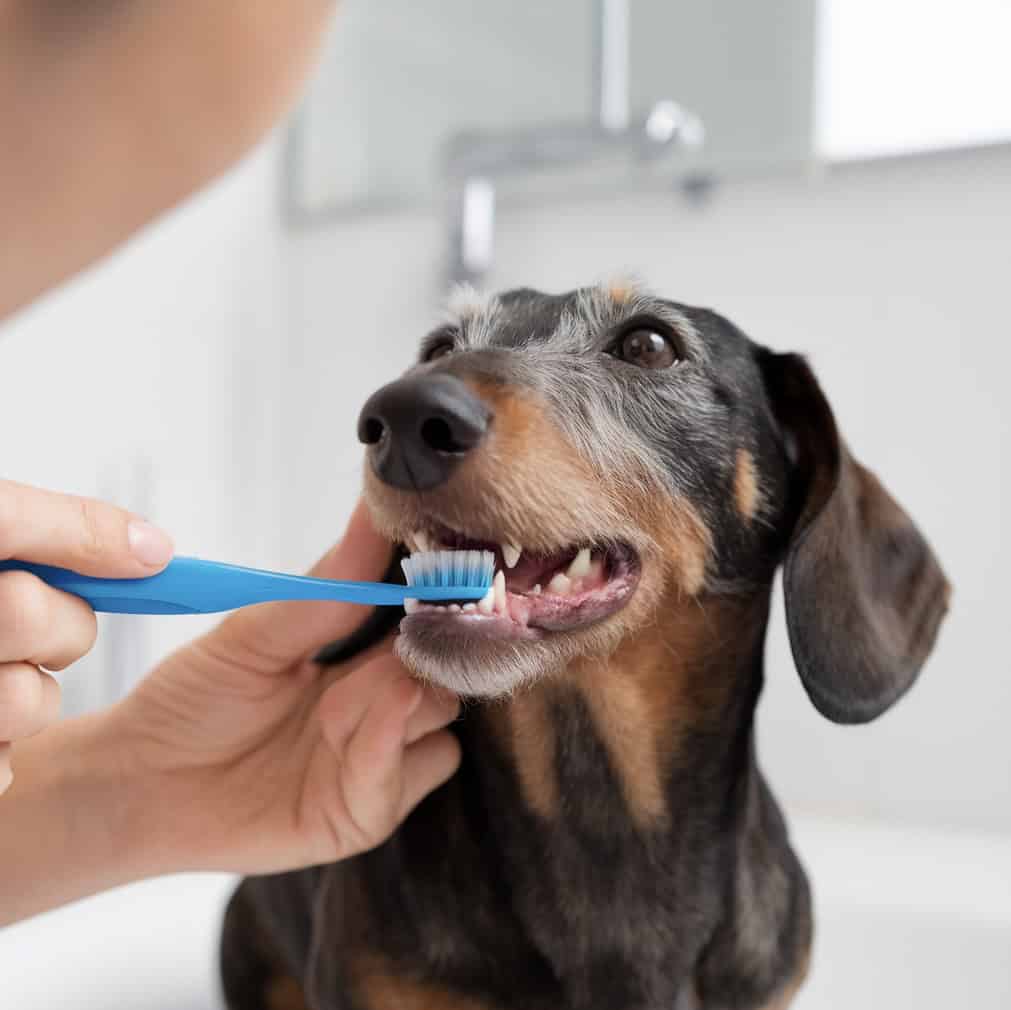
4️⃣ 🏋️♂️ Maintaining a Healthy Weight
🍽️ Proper Diet
Obesity is a common issue in Dachshunds, and it can lead to a host of other health problems.
Feeding your dog a balanced diet that’s low in fat and high in protein is essential.
Avoid giving them table scraps and treats that are high in calories.
🏃♂️ Regular Exercise
Along with a healthy diet, regular exercise is crucial for keeping your Dachshund’s weight in check.
Daily walks and playtime not only help them stay fit but also keep them mentally stimulated.
Make sure to tailor the exercise to their age and physical condition.
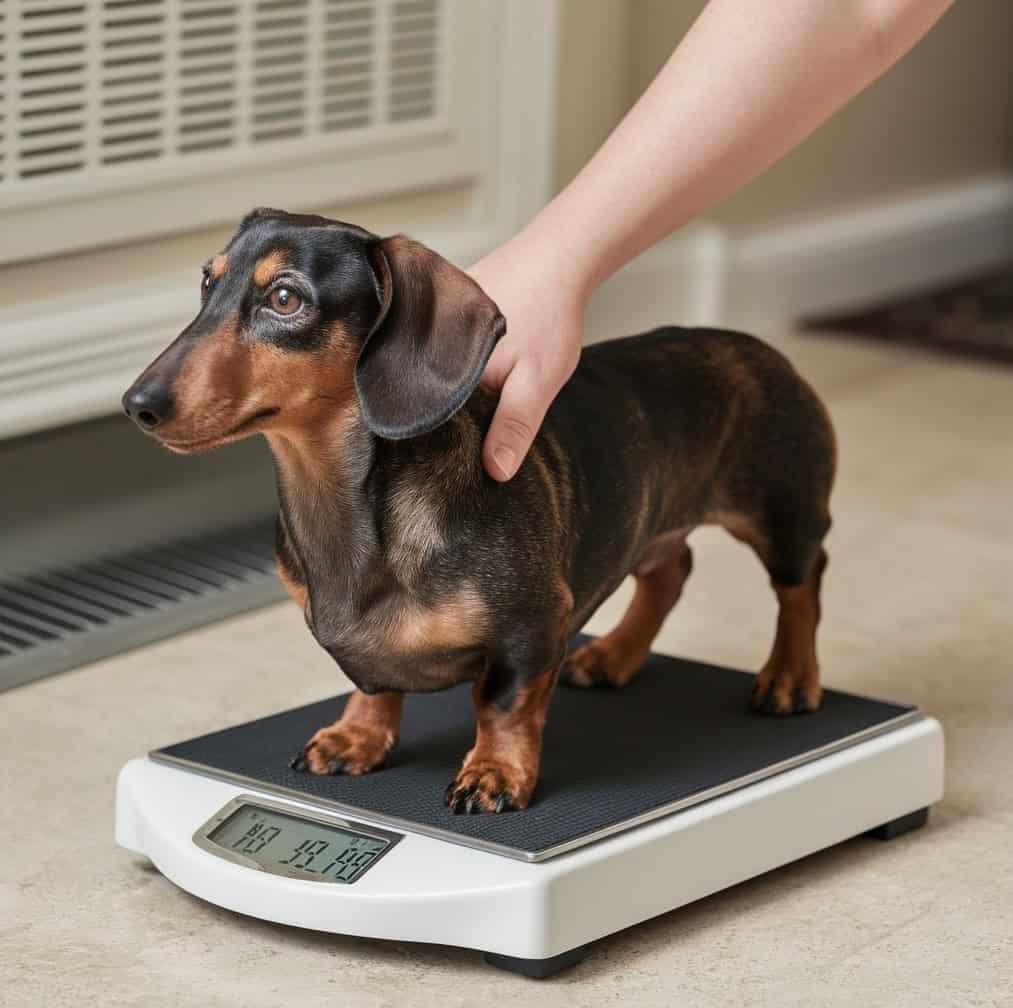
5️⃣ 🦠 Parasite Prevention
🪲 Flea and Tick Control
Dachshunds, like all dogs, are vulnerable to parasites like fleas and ticks.
These pests can cause a range of issues, from skin irritation to serious diseases.
Using a vet-recommended flea and tick preventative can keep these parasites at bay.
💉 Heartworm Prevention
Heartworm is another serious concern for Dachshunds.
Administering monthly heartworm preventatives is essential to protect your dog from this potentially fatal disease.
Regular vet check-ups will ensure your Dachshund stays heartworm-free.

6️⃣ 🩹 Skin and Coat Care
🛁 Regular Bathing
Dachshunds come in three coat types—smooth, longhaired, and wirehaired—each with its own grooming needs.
Regular bathing with a dog-specific shampoo helps keep their coat clean and free from parasites.
Be sure to use lukewarm water and avoid over-bathing, which can dry out their skin.
🧴 Moisturizing and Brushing
Brushing your Dachshund’s coat regularly helps remove loose hairs and prevent matting, especially for longhaired and wirehaired varieties.
Using a dog-safe moisturizer can also keep their skin healthy and hydrated.
This is particularly important in dry or cold climates.

7️⃣ 🧠 Mental Stimulation
🧩 Puzzle Toys
Mental stimulation is just as important as physical exercise for your Dachshund.
Puzzle toys are a great way to keep their minds engaged and prevent boredom.
These toys challenge their problem-solving skills and provide a healthy outlet for their energy.
🐕 Obedience Training
Training sessions are another excellent way to stimulate your Dachshund mentally.
Teaching them new commands and tricks not only keeps their mind sharp but also strengthens your bond.
Short, consistent training sessions are most effective.

8️⃣ 💤 Adequate Rest
🛏️ Creating a Comfortable Sleeping Area
Rest is crucial for your Dachshund’s health and well-being.
Providing a comfortable bed in a quiet area of your home ensures they get the rest they need.
Make sure the bed supports their back properly to prevent any strain.
😴 Managing Nap Times
Dachshunds love to nap, and it’s important they get enough rest throughout the day.
Ensure they have a peaceful environment for napping, free from disturbances.
This helps them recharge and stay active during playtime.

9️⃣ 💉 Vaccinations and Regular Check-Ups
📅 Keeping Vaccines Up to Date
Vaccinations are essential to protect your Dachshund from common diseases like distemper, parvovirus, and rabies.
Follow your vet’s recommended vaccination schedule to keep your dog safe.
This is especially important if your Dachshund spends time around other dogs.
🩺 Annual Veterinary Visits
Regular vet visits are crucial for monitoring your Dachshund’s health.
These check-ups allow your vet to catch any potential issues early and provide appropriate care.
Routine blood work and physical exams are typically part of these visits.
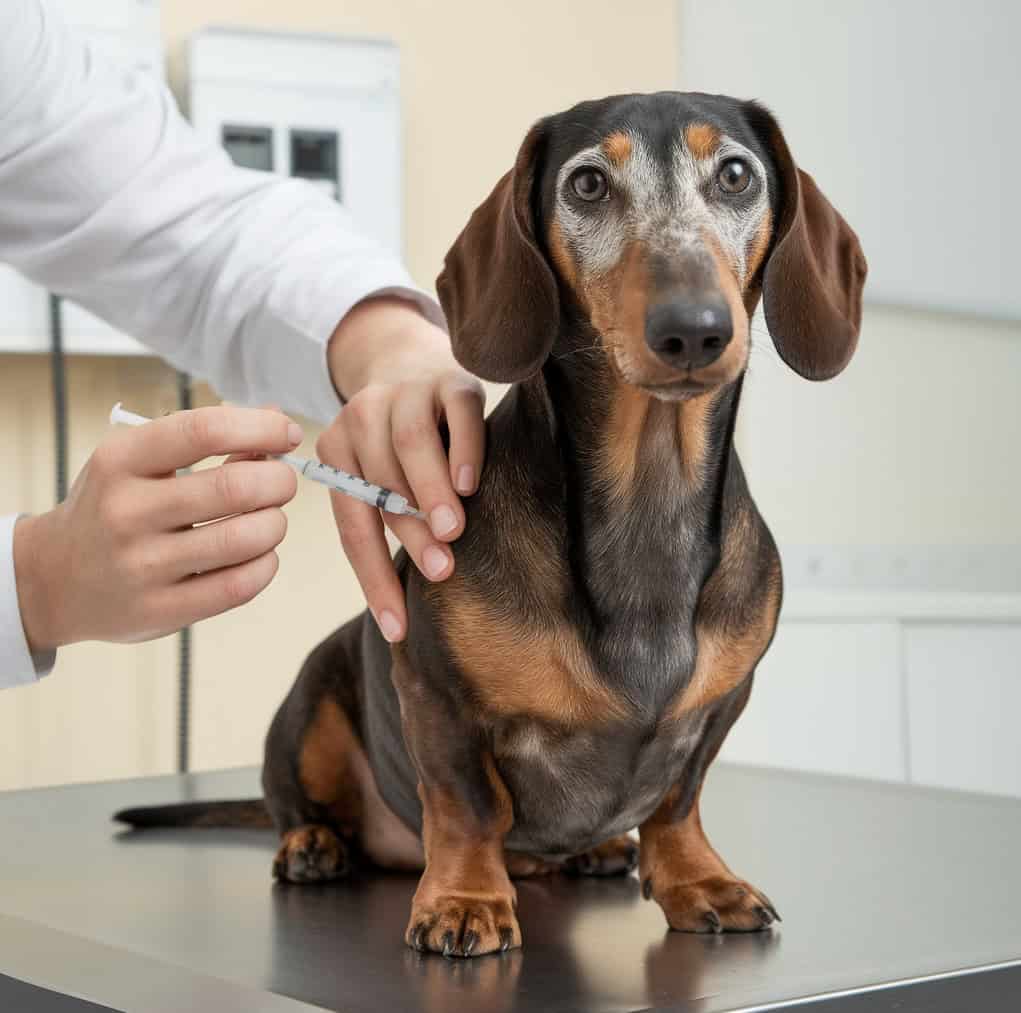
1️⃣0️⃣ 🚶♂️ Safe Walking Practices
🐾 Using a Harness
When walking your Dachshund, it’s important to use a harness rather than a collar.
A harness distributes pressure more evenly across their body, protecting their neck and back.
This is particularly important for Dachshunds, who are prone to back problems.
🌳 Choosing the Right Terrain
Dachshunds love to explore, but not all terrain is suitable for them.
Stick to flat, even surfaces that won’t strain their back or joints.
Avoid rocky or steep areas that could cause injury.
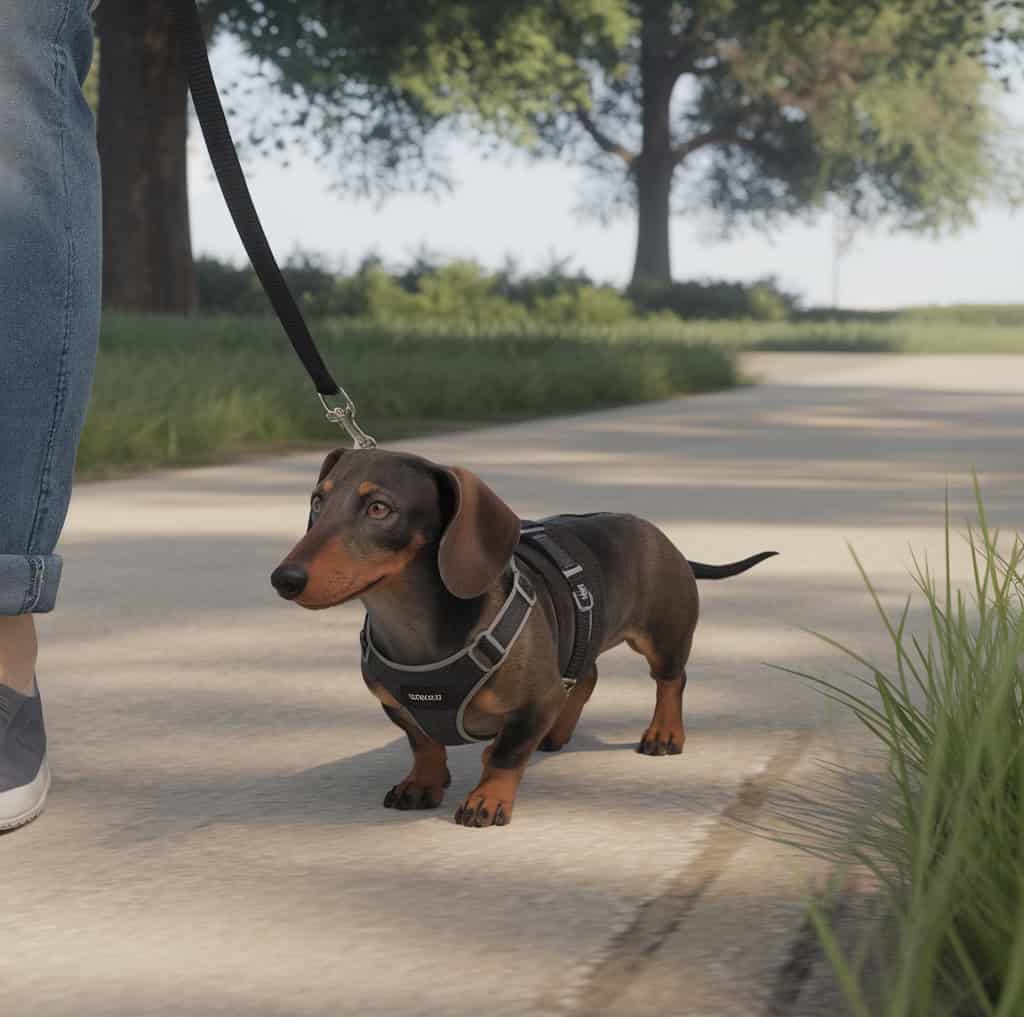
1️⃣1️⃣ 🏠 Creating a Safe Home Environment
🛋️ Furniture Safety
Dachshunds are prone to back injuries, so it’s important to create a safe environment at home.
Avoid allowing them to jump off furniture, which can lead to serious back problems.
Consider using ramps or steps to help them get on and off furniture safely.
🚪 Securing Hazardous Areas
Just like with any dog, it’s important to secure areas of your home that could be dangerous for your Dachshund.
Use baby gates to block off stairs and ensure they can’t access toxic substances.
This helps prevent accidents and keeps your dog safe.
1️⃣2️⃣ 🎉 Socialization and Behavior Management
👫 Meeting New People
Dachshunds are known for being loyal and sometimes a bit wary of strangers.
Introducing them to new people gradually helps them become more comfortable and confident.
This is particularly important when they’re young.
🐕🦺 Interacting with Other Dogs
Socializing with other dogs is also crucial for your Dachshund’s well-being.
Take them to dog-friendly parks or arrange playdates to help them learn proper social behaviors.
This reduces the risk of fear or aggression toward other dogs.
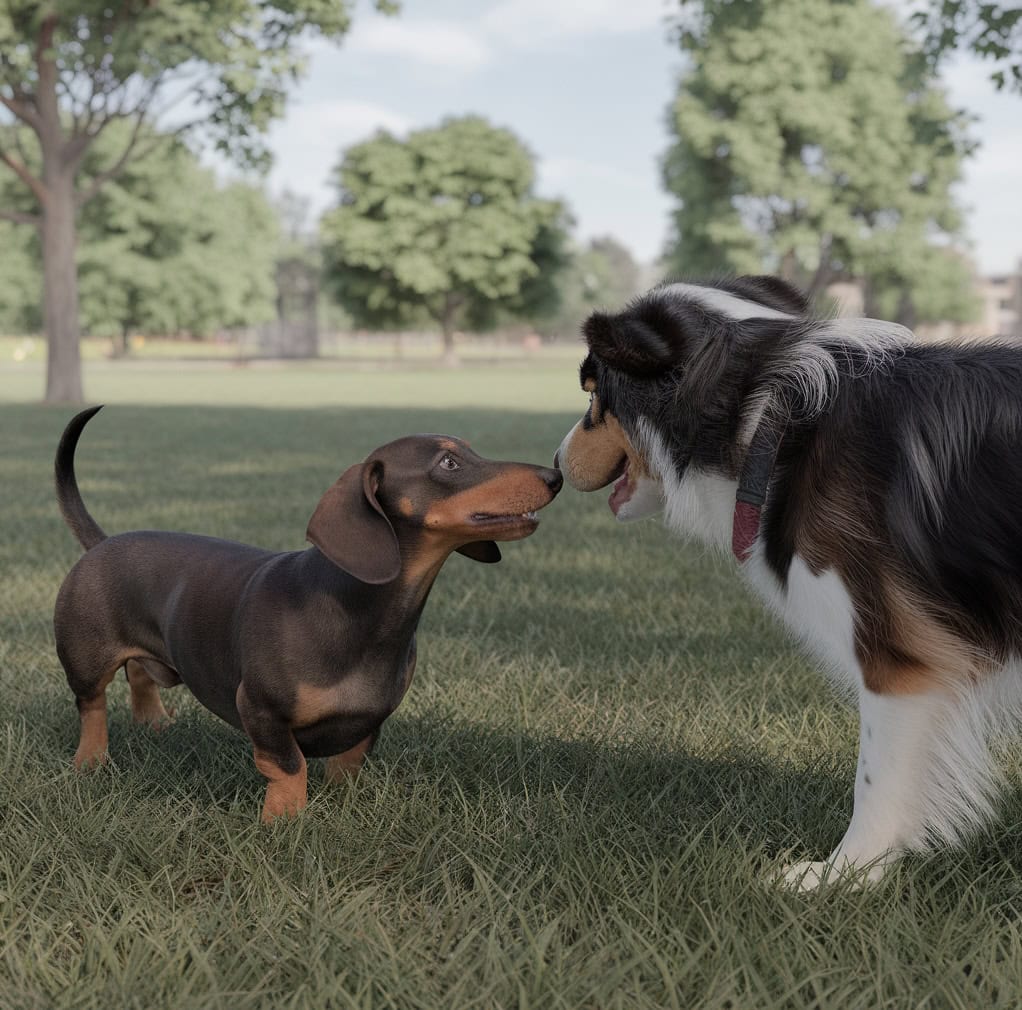
1️⃣3️⃣ 🧳 Traveling with Your Dachshund
🚗 Safe Car Rides
Traveling with your Dachshund requires some planning to ensure their safety and comfort.
Use a dog seatbelt or a travel crate to keep them secure during car rides.
This prevents accidents and reduces anxiety for your dog.
🏨 Pet-Friendly Accommodations
If you’re traveling overnight, it’s important to find pet-friendly accommodations.
Look for hotels or rentals that welcome dogs and provide a safe, comfortable environment for them.
This makes traveling more enjoyable for both you and your Dachshund.

1️⃣4️⃣ 🎂 Senior Dachshund Care
🦴 Adjusting Diet and Exercise
As your Dachshund ages, their needs will change, particularly in terms of diet and exercise.
Switch to a senior dog food that’s formulated to support aging joints and overall health.
Adjust their exercise routine to match their energy levels and physical abilities.
🩺 Monitoring for Age-Related Issues
Senior Dachshunds are more susceptible to health issues like arthritis, heart disease, and cognitive decline.
Regular vet visits become even more important as your dog ages, allowing you to catch and manage these issues early.
Provide plenty of love and attention to ensure their golden years are happy and comfortable.

1️⃣5️⃣ 🗣️ Communication with Your Dachshund
🐕 Understanding Body Language
Effective communication with your Dachshund starts with understanding their body language.
Pay attention to their posture, tail position, and facial expressions to gauge their emotions.
This helps you respond to their needs and keep them happy.
🗣️ Responding to Vocalizations
Dachshunds are known for being vocal, and each bark or whine has a different meaning.
Learn to recognize what your Dachshund is trying to communicate through their vocalizations.
This strengthens your bond and helps you address any issues promptly.

🔚 Conclusion: Dachshund Health and Wellness: Common Issues and Prevention
Taking care of a Dachshund’s health and wellness requires knowledge, commitment, and love.
By understanding the common issues they face and taking proactive steps, you can ensure your Dachshund lives a long, happy life.
Remember, prevention is always better than cure, and your efforts will be rewarded with a loyal and loving companion.
For further reading, you can check out these resources:
I hope you find this guide helpful and enjoy every moment with your Dachshund! 🐾
